Tech
Electric cars now MORE reliable than petrol and diesel counterparts
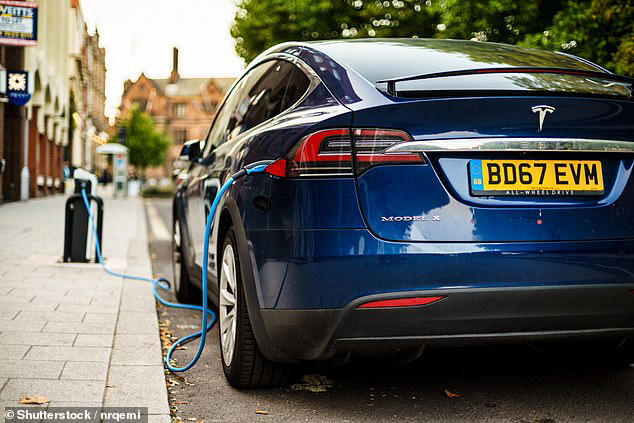
Electric vehicle (EVs) sales have slumped in Britain, with the public struggling to fall in love with the technology.
A shortage of public chargers fuels ‘range anxiety’ among motorists worried about where they can top up their batteries, while high prices have also put off would-be buyers.
Despite these fears, a new study claims that EVs are even more reliable than traditional cars and vans with petrol and diesel engines.
Researchers from the University of Birminghamand the London School of Economics (LSE), analysed the ‘health’ of nearly 300 million vehicles on UK roads.
Their analysis found that battery electric vehicles (BEVs) not only had a lower likelihood of failure, but also a comparable lifespan to traditional cars and vans.
According to the team, this marks a ‘pivotal moment in the drive towards sustainable transportation’.
Co-author Dr Viet Nguyen-Tien, from the LSE, said: ‘Our findings provide critical insights into the lifespan and environmental impact of electric vehicles.
‘No longer just a niche option, BEVs are a viable and sustainable alternative to traditional vehicles – a significant step towards achieving a net-zero carbon future.’
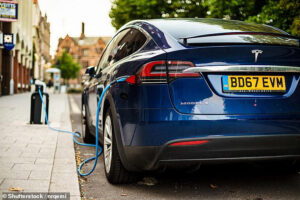
A new study claims that EVs are even more reliable than traditional cars and vans with petrol and diesel engines
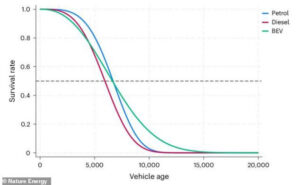
Their analysis found that battery electric vehicles (BEVs) not only had a lower likelihood of failure, but also a comparable lifespan to traditional cars and vans
In the study, the team used nearly 300 million UK Ministry of Transport test records to analyse UK vehicles from 2005 to 2022.
This allowed them to estimate the reliability and longevity of each vehicle.
Their analysis revealed that BEVs demonstrated the most rapid improvement in reliability, with a 12 per cent lower likelihood of failure for each successive year of production.
For comparison, these figures were only 6.7 per cent and 1.9 per cent for petrol and diesel vehicles, respectively.
In addition, the results revealed that BEVs now have an average lifespan of 18.4 years and can travel up to 124,000 miles.
Petrol cars have a slightly longer average lifespan of 18.7 years, but with a lower mileage of 116,000 miles.
Meanwhile, diesel cars have a higher mileage (159,000 miles), but a shorter lifespan of 16.3 years.
As part of the study, the team also identified the top-performing brands in terms of vehicle longevity.
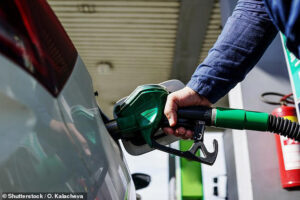
In the study, the team used nearly 300 million UK Ministry of Transport test records to analyse UK vehicles from 2005 to 2022 (stock image)
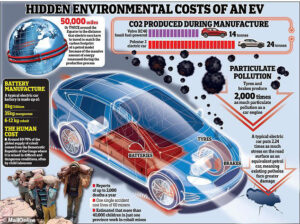
EVs have lower greenhouse gas emissions overall when compared with conventional cars, but there are some hidden environmental costs of an electric car
Among BEVs, Tesla leads the charge, while Audi is the best performer for petrol, and Skoda is the top for diesel.
‘BEVs offer significant environmental benefits, especially as Europe switches to a more renewable energy mix,’ said study co-author Robert Elliott, Professor of Economics at the University of Birmingham.
‘Despite higher initial emissions from production, a long-lasting electric vehicle can quickly offset its carbon footprint, contributing to the fight against climate change – making them a more sustainable long-term option.
‘Our findings offer consumers reliable data to make informed decisions about their vehicle purchases, whilst policymakers can use our insights to shape regulations and incentives that promote the adoption of durable and environmentally friendly vehicles and plan ahead their end-of-life treatment.’
However, the study comes as sales of electric cars have slowed in Britain.
A shortage of public chargers fuels ‘range anxiety’ among motorists worried about where they can top up their batteries, while high prices have also put off would-be buyers.
Electric vehicles run on energy from a charged battery much like a smartphone but come with hefty pricetags – around £46,000 on average in the UK.
‘Electric vehicles typically cost more upfront,’ say Milad Haghani, lecturer in urban analytics at UNSW Sydney, and Hadi Ghaderi, a supply chain professor at Swinburne University of Technology, in a piece for The Conversation.

Their analysis revealed that BEVs demonstrated the most rapid improvement in reliability, with a 12 per cent lower likelihood of failure for each successive year of production. For comparison, these figures were only 6.7 per cent and 1.9 per cent for petrol and diesel vehicles, respectively
‘Sales have slowed in parts of Europe and the United States often due to reduced incentives, but strong sales growth continues in other regions such as China and India.’
The two experts say a ‘flood of cheaper Chinese vehicles’ is lowering the cost barrier.
However, these Eastern exports have triggered surveillance fears.
Another ‘major issue’ for car buyers is uncertainty about an electric model’s resale value compared to a standard petrol or diesel, the researchers point out.
‘Consumers are concerned electric vehicles depreciate faster than traditional cars… these concerns are particularly tied to battery degradation, which affects a car’s range and performance over time.’
Meanwhile, EV fires have made headlines globally – including a high-profile battery fire in a Korean parking lot in August – creating doubts among consumers.
Tech
Google acquires energy company Intersect for $4.75 billion
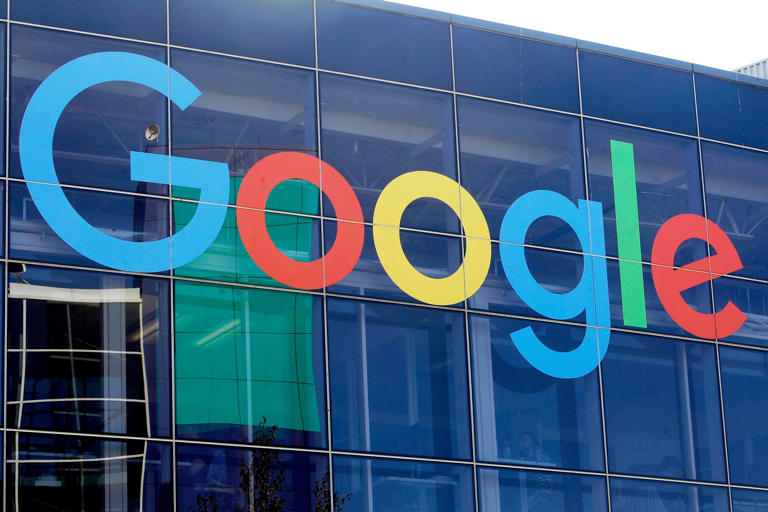
Google is acquiring energy infrastructure company ‘Intersect’ for $4.75 billion (approximately 7 trillion Korean won) to secure the power needed for its AI (artificial intelligence) data centers. The move aims to address the power issue, the biggest hurdle in expanding data centers. Google, which developed the ‘Gemini’ AI, is a so-called ‘AI full-stack’ company equipped with all AI-related technologies and services, including AI chips and cloud (virtual servers). The strategy is to directly manage the energy infrastructure needed to actually operate AI as well.
Reuters reported on the 22nd (local time) that Google is acquiring Intersect for $4.75 billion in cash. Google already holds a minority stake in Intersect, and through this acquisition, it will also secure the gigawatt (GW)-level energy and data center projects that Intersect is developing and constructing. Intersect is expected to be responsible for building Google’s data center power infrastructure in the U.S., based on its technology linking power generation facilities and power grids.
Sundar Pichai, CEO of Google and Alphabet, said, “Intersect will enable us to build power infrastructure more quickly and flexibly in line with the increasing demand for AI data centers,” adding, “It will also be an important partner in strengthening America’s energy innovation and technological leadership.”
Bloomberg reported that Intersect’s energy assets currently in operation or under construction in the U.S. amount to $15 billion (approximately 22.2 trillion Korean won).
◇Google increasing energy investments
Google has recently been increasing its investments in the energy sector. Although the company possesses AI chips (TPUs), Gemini, and search and cloud services, stable energy supply is essential to support these businesses.
To this end, Google is also investing in nuclear power technology. In October of last year, it signed a long-term cooperation agreement with small modular reactor (SMR) startup ‘Kairos Power’ to secure up to 500 MW (megawatts) of power. It is noted as the first case among big tech companies to publicly declare securing SMR-based power. Additionally, in August, Google and Kairos Power announced plans to build the next-generation SMR ‘Hermes 2’ in Oak Ridge, Tennessee. The goal is to commence operation in 2030.
Google is also restarting previously shut-down nuclear power plants to secure energy. In October, it announced that it will collaborate with ‘NextEra Energy’ to restart the Duane Arnold Nuclear Generating Station in Iowa, which was closed in 2020. The target restart period is between 2028 and 2029.
Google is also investing in renewable energy such as geothermal power. Since 2023, it has been supplying power to data centers through geothermal power generation with ‘Fervo Energy’ in Nevada, U.S.
Google is also actively investing in next-generation energy technologies that are not yet commercialized. In 2022, it made a large-scale investment in ‘TAE Technologies,’ which possesses nuclear fusion technology. Nuclear fusion power generation is a technology that applies the principle of energy creation in the sun, combining atomic nuclei to produce energy. It is called the ‘dream energy’ because it has abundant fuel resources, emits no carbon, and, unlike conventional nuclear power plants, does not produce high-level nuclear waste. However, it is assessed that more time is needed for commercialization due to technical challenges. Recently, TAE Technologies has accelerated the commercialization of fusion energy by merging with Trump Media Group (TMTG).
Tech
“I Lost $1.2 Million To Hackers On One Of My Apps. I Caught One Of The Hackers, And Instead Of Handing Him Over To The Police, I Employed Him To Work For Me.”- BLord

Anambra Born tech entrepreneur and businessman Linus Williams, popularly known as BLord, has shared an unusual story about how he handled a major cyberattack on one of his applications.
According to BLord, he lost $1.2 million to hackers who infiltrated one of his digital platforms. In the course of tracking the incident, he successfully identified one of the individuals involved in the breach.
Rather than handing the suspect over to security agencies, BLord said he made a strategic decision: he employed the hacker.
He explained that the hacker’s skills, though misapplied, were exceptional and could be redirected towards strengthening his company’s cybersecurity systems.
BLord noted that the decision was driven by a desire to turn a negative experience into an opportunity for growth and to better secure his business infrastructure.
Tech
MAN Honours Zobis Cable CEO, Ezeobi, at 37th AGM

The MD/CEO of John Zobis Group, Mr. John Ezeobi, has again been honoured with another major industry prize in recognition of his contributions to local sourcing, innovation and the growth of Nigeria’s manufacturing capacity.
The prestigious award, “Pillar of Industrial Enterprise and National Impact,” which was conferred on him by the Manufacturers Association of Nigeria (MAN) — Anambra, Ebonyi and Enugu Zone, was presented during the association’s 37th Annual General Meeting, Awards & Gala Night at the International Conference Centre, Enugu.
coming barely three weeks after Ezeobi was nominated as the winner of The Sun’s Industrialist of the Year Award 2025 by the Management of The Sun Newspaper, a run of recognition that has further highlighted his rising profile in the South-East manufacturing ecosystem.
The latest award, it was gathered, celebrates Ezeobi’s deliberate investment in backward integration, his push for local sourcing of raw materials and efforts to strengthen domestic value chains, which MAN described as essential to reducing import dependence and creating jobs across the region.
Chaired by Chief Obinna Iyiegbu (Obi Cubana), the well-attended occasion, themed “Exploring Opportunities for Backward Integration and Local Sourcing of Raw Materials for the Manufacturing Sector,” brought together regulators, policymakers, manufacturers and industry stakeholders and also featured presentations, panel sessions and cultural performances, among other highlights.
Speaking at the event, the Keynote Speaker and Director-General of the Raw Materials Research and Development Council (RMRDC), Prof. Nnanyelugo Ike-Muonso, said the economic benefits of exploring Opportunities for backward integration and local sourcing of raw materials for the Manufacturing sector cannot be overemphasized.
Prof. Ike-Muonso told delegates that Nigeria spent over ₦3.53 trillion importing raw materials in the first half of 2025 alone, warning that such dependence continues to weaken the nation’s economy. He further argued that the proposed 30% Value Addition Bill, which would require a minimum local value addition before export, would be transformational if signed into law.
He also outlined the bill’s potential to expand GDP, generate hundreds of thousands of jobs and save foreign exchange by keeping more of the country’s raw-material wealth in domestic supply chains, boost local manufacturing, and generally reposition Nigeria as a regional industrial hub.
On his own part, the Governor of Enugu State, Dr. Peter Mbah, endorsed the call for stronger industry-academia partnerships and urged financial institutions to make affordable credit available to manufacturers who adopt backward integration. The governor, who was represented by his Deputy, Barrister Ifeanyi Ossai, described the policy pathway as key to moving Nigeria from resource export dependence toward higher-value industrial output.
Reacting via his social handle shortly after receiving the award, the Zobis Cable Boss expressed gratitude for the honour, describing it as a strong motivation to do more in driving local production, reducing import dependence, and strengthening Nigeria’s industrial base.
Ezeobi, who received the plaque from pioneer Nollywood star and legal practitioner, Barr. Kenneth Okonkwo, attested that the AGM provided a critical platform for renewed commitment to backward integration as a pathway to sustainable industrial development.
“The event highlighted the critical importance of backward integration and local sourcing of raw materials as strategic levers for strengthening domestic production, reducing import dependency, and building resilient, self-sustaining industries. A meaningful platform for driving progress and collaboration across Nigeria’s manufacturing sector,” he partly wrote.
Also speaking, the Chairman of MAN for the Anambra-Ebonyi-Enugu zone, Dr. Adaora Chukwudozie, described local sourcing as the pragmatic route to lowering production costs and stabilizing supply chains for SMEs and larger manufacturers alike. She welcomed RMRDC’s roadmap and invited state governments to partner in establishing raw-material corridors and shared processing facilities that would bring inputs closer to factories.
The event, which had His Eminence, Eze Eberechukwu Orji, Eze Aro, as the Royal Father of the Day, was also graced by other notable dignitaries and stakeholders, which include Senator Osita Izunaso, Dr. Gideon Chidiebere Osi, Ichie Sunday Ezeobiora , Chairman, Sunchi Farms; Mr Linus Williams Ifejika, Chairman Blord Group; Otumba Francis Meshioye, National President, Manufacturers Association of Nigeria; Dr. Ifeanyi Okoye, Chairman, Juhel Pharmacy; Chief Dr. Dan Chukwudozie, Chairman,Dozzy Group; Dr. Chike Obidigbo,Chairman, Hardis and Dromedas; Anambra Commissioner for Trade and Industry,Mr. Christian Udechukwu.














-
Business1 year ago
US court acquits Air Peace boss, slams Mayfield $4000 fine
-

 Trending1 year ago
Trending1 year agoNYA demands release of ‘abducted’ Imo chairman, preaches good governance
-

 Politics1 year ago
Politics1 year agoMexico’s new president causes concern just weeks before the US elections
-

 Politics1 year ago
Politics1 year agoPutin invites 20 world leaders
-

 Politics1 year ago
Politics1 year agoRussia bans imports of agro-products from Kazakhstan after refusal to join BRICS
-
Entertainment1 year ago
Bobrisky falls ill in police custody, rushed to hospital
-
Entertainment1 year ago
Bobrisky transferred from Immigration to FCID, spends night behind bars
-
Education1 year ago
GOVERNOR FUBARA APPOINTS COUNCIL MEMBERS FOR KEN SARO-WIWA POLYTECHNIC BORI













